
Lt. Col. John D. Landers flew with the 78th FG from February to June 1945. He flew 17 missions with us and his mount was P-51D WZ-I 44- 72218 Big Beautiful Doll of the 84th FS.
Of all the questions I have been asked about the P-47 Thunderbolt and the P-51 Mustang, this has been the dominant one: “Which one was the best: the ‘Jug’ or the Mustang?” Even though I devoted a couple of paragraphs in my book, Target of Opportunity, to this popular subject, there were still many details about each, especially relating to combat, that I didn’t cover completely. And had I known of its keen popularity on the minds of buffs of every age, I would have made it into a whole chapter. I knew the controversy existed—and was often discussed quite heatedly— but it was friendly between pilots who had flown only one of the two in combat. The terms “Spam can” and “bucket of bolts” were often digs used by opponents to characterize the two. My descriptive terms were never these. Had I tagged them, mine would have been “Beauty and the Beast”: the P-51 and the P-47, in that order.
Although our Mustangs were sleeker and speedier, our Thunderbolts could take a lot more punishment and still bring us home. (Photos by John Dibbs/planepicture.com)
Ask any member of the famed 56th Fighter Group who is still on the right side and standing, and I’ll bet my month’s Social Security check that you get one answer. What else: the Jug! The 56th was the only Group in the 8th Fighter Command that officially flew only the P-47 in combat. But in fairness to Zemke’s Wolfpack, if Jug lovers posed the same question to anyone in the Ninth Air Force Fighter Groups who flew only the Jug in combat, their responses would also be the same.
This story is from the June 2020 edition of Flight Journal.
Start your 7-day Magzter GOLD free trial to access thousands of curated premium stories, and 9,000+ magazines and newspapers.
Already a subscriber ? Sign In
This story is from the June 2020 edition of Flight Journal.
Start your 7-day Magzter GOLD free trial to access thousands of curated premium stories, and 9,000+ magazines and newspapers.
Already a subscriber? Sign In

Keeping 'em Flying!- The new generation of warbird pilots, restorers and mechanics
The new generation of warbird pilots, restorers and mechanics. Nearly 80 years after the end of World War II, the fighters, bombers, and trainers that defended freedom continue to enthrall and inspire audiences at airshows, thanks to generations of warbird pilots, maintainers, restoration specialists and collectors. In our September, 2022 issue we introduced you to the young warbird pilots, maintainers and restorers who are already beginning to displace more "experienced" warbird fliers and fixers.

The Corsair Maker- Bringing the Vought Corsair to the fleet was a daunting challenge that spanned nearly three years.
When the first production Corsairs exited the Stratford factory in June 1942, Guyton, as seen here, was tapped to manage the flight and production test program. Armament was improved to six wing-mounted .50s, displacing the wing fuel tanks now placed forward of the cockpit which necessarily was moved rearward by 32 inches. Overall length was increased, armor plate added, landing, arresting and tail gear improved, aileron control enhanced, and a new version of the R2800 engine was incorporated. But those significant improvements unearthed numerous idiosyncrasies that would take an extended period to make the Corsair acceptable for carrier operations
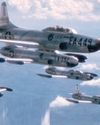
STARFIRES Over Korea
F-94 pilots tangle with MiGs
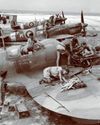
Training Mission
BY THE TIME THIS TRAINING SCENE WAS RECORDED in Canne, Italy, in July 1944, Allied Yugoslavian airmen had several years of experience working side by side with the RAF.
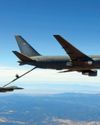
KC-46A PEGASUS
Next generation aerial refueler
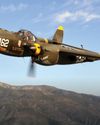
"SATAN'S ANGELS" ACE - Tales from a P-38 pilot in the South Pacific
\"AS A KID GROWING UP on the bow of my father's tugboat, hauling oil from Seattle to Alaska, I had a lot of time on my hands.
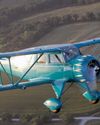
WACO YKC - Stunning and Ultra Rare Golden Age Cabin Flier
BETWEEN THE IMPLEMENTATION of the Air Commerce Act of 1926 and December 31, 1948, all U.S. registered flying machines sported an N-number, much as they do today, the \"N\" being an internationally recognized identifier for the United States. During that period, however, an additional letter-identifier followed the \"N.\" Depending on their category, they were registered in the NC (Commercial), NG (Glider), NL (Limited), NR (Restricted, usually meaning race airplanes), NS (State government), and, finally, NX (experimental).
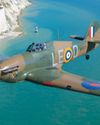
BADER'S HURRICANES
Double amputee fighter ace Douglas Bader and his Battle of Britain Hurricanes
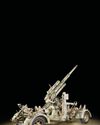
Scourge of the Allied Fighters
IT HAD TO BE THE MOST HELPLESS FEELING in the world: you're at 25,000 feet over Europe knowing that your primary function is to drop bombs-or flying escort for the bombers while being a slow-moving target for some of the world's finest shooters. However, you have John Browning's marvelous .50 caliber invention to give some degree of protection. Unfortunately, you're absolutely helpless against flak. Piloting and gunnery skills play no role in a game where sheer chance makes life and death decisions. For that reason, the Krupp 88 mm Flak 18/36/37 AA cannon could be considered WW II's ultimate stealth fighter. You never saw it coming.
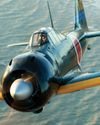
ZERO MYTH, MYSTERY, AND FACT
A test pilot compares the A6M5 Zero to U.S. fighters